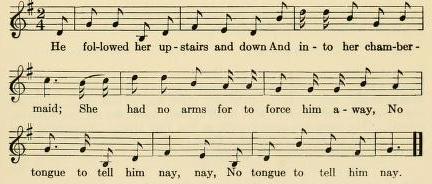The Seven Sisters- Gordon (NC) 1928 Brown B
[From Brown Collection of NC Folklore Vol. 2; There are 7 versions of text A-G plus six additional versions with music in Vol. 4. Maude Minnish Sutton, of Lenoir, Caldwell county, started collecting for Brown about 1920. Aunt Becky Gordon was a frequent contributor to the Brown Collcetion and a favorite informant of Sutton's. Below (at the bottom of the page) is a transcription of the music.
R. Matteson 2011; 2014]
OLDER BALLADS MOSTLY BRITISH
Lady Isabel and the Elf-Knight (Child 4)
For the history of this ballad in many lands and tongues, see Child's headnote in English and Scottish Popular Ballads and Grundtvig's in Danmarks gamle Folkeviser, and for its occurrence since Child's time in the British Isles and in America, see BSM 5-6 — and add to the references there given Arkansas (OFS I 47), Florida (FSF 237-41), and Missouri (OFS I 45-6). It is a favorite among the ballad singers of North Carolina; Mrs. Sutton reports that it was sung by Mrs. Hall in Buncombe county, by Mrs. Gordon in Henderson county, by Mrs. Brown in Avery county, and others. Mrs. Steely records three texts, with tunes, found in the Ebenezer community in Wake county. The name of the heroine varies. Most often it is Polly. The names Clovanne (in version C) and Cold Rain (in version D) may be assumed to derive from the May Colvin of British broadside versions. The villain, if named at all — as generally he is not in the North Carolina versions — is William. All three of the scenes that make up the story, the elopement, the drowning, the dialogue with the parrot, are present in all the North Carolina versions, even the much reduced F. Versions D, E, and G show the shift of grammatical person from the first person to the third which is so frequent in traditional balladry.
B. 'The Seven Sisters.' Another version secured later (in the summer of 1928) by Mrs. Sutton from the singing of Mrs. Rebecca Gordon of Saluda Mountain, Henderson county. In this the modesty motif is omitted (after stanza 3). In the manuscript the final syllable of each stanza except the first is twice repeated as in the preceding line. This procedure, which violates the customary rhythm of ballad verse, I have assumed to be an error of transcription and have accordingly reduced each stanza to the norm of stanza 1. The "fuss" of stanza 5 is presumably a miswriting (it could hardly be a mishearing) of "fair," the adjective commonly applied to Scotland in this place. For the reading "maid" in the second line I have no explanation ; to read it "made" does not greatly help. Stanza 2 has lost one line and stanza 4 has lost three.
1 He followed her upstairs and down
And into her chamber maid;
She had no arms for to force him away,
No tongue for to tell him nay nay nay,
No tongue for to tell him nay.
2 She told him to go to her father's stable
And choose two of the best horses
Out of thirty-two or three three three,
Out of thirty-two or three.
3 They rode and they rode till the middle of the night.
Until they came to the sea.
He said, 'Here I've drowned six king's daughters.
And the seventh you shall be be be,
And the seventh you shall be.'
4 She picked him up so strong in her arms
And splunged[1] him into the sea.
5 'Come here, come here, my pretty Polly dear.
Come pull me out of here;
I'll take you to the fuss Scotland
And there I'll marry thee thee thee,
And there I'll marry thee.'
6 'Lie there, lie there, you false young man.
Lie there in place of me;
For here you drownded six king's daughters
And the seventh drownded thee thee thee.
And the seventh drownded thee.'
7 She mounted on the milk-white steed
And led the dappled bay.
She came home to her father's hall
One hour before 'twas day day day,
One hour before 'twas day.
8 A-passin' by her parrot's cage
He begun to chatter to me;
'What's the matter, [2]pretty Polly dear,
Makes you travel so long before day day day,
Makes you travel so long before day?'
9 'Hush up, hush up, pretty Polly dear.
And tell no tales on me;
I'll make your cage of the new Buton[3] gold,
With a door of ivory ry ry,
With a door of ivory.'
10. The parrot chattered till her father woke,
All in his bed he lay;
Said, 'What's the matter, pretty parrot bird.
Makes you chatter so long before day day day,
Makes you chatter so long before day?'
11. 'The cat he's a-settin' at my cage door,
Saying he will savour me;
I was a-callin' to pretty Polly dear
To drive the cat away, way way.
To drive the cat away.'
Footnotes:
1. plunged; the stanza could be finsihed:
He turned his eyes away from her
To the bright green leaves on the tree,
And she picked him up so strong in her arms
And plunged him into the sea, sea, sea,
And plunged him into the sea.
The preceding stanza is missing (about taking off her fine clothes), so this isn't a good solution unless you add that stanza.
2. The manuscript has "do" before "pretty"; presumably a meaningless slip of the pen.
3. new beaten gold
-----------------
B. 'The Seven Sisters.' Sung by Mrs. Rebecca (Aunt Becky) Gordon. Recorded at Tuxedo, Henderson county, July 19, 1939. In another recording (VIAI-3) the same singer uses this tune with but slight changes for her version of 'The House Carpenter' (No. 40; II, 171).

For melodic relationship, cf. *TNFS 43 measures 5-6.
Scale: Heptachordal, plagal. Tonal Center: g. Structure: abca1d (2,2,2,2,2)
= ab (4,6); b is terminally incremented.